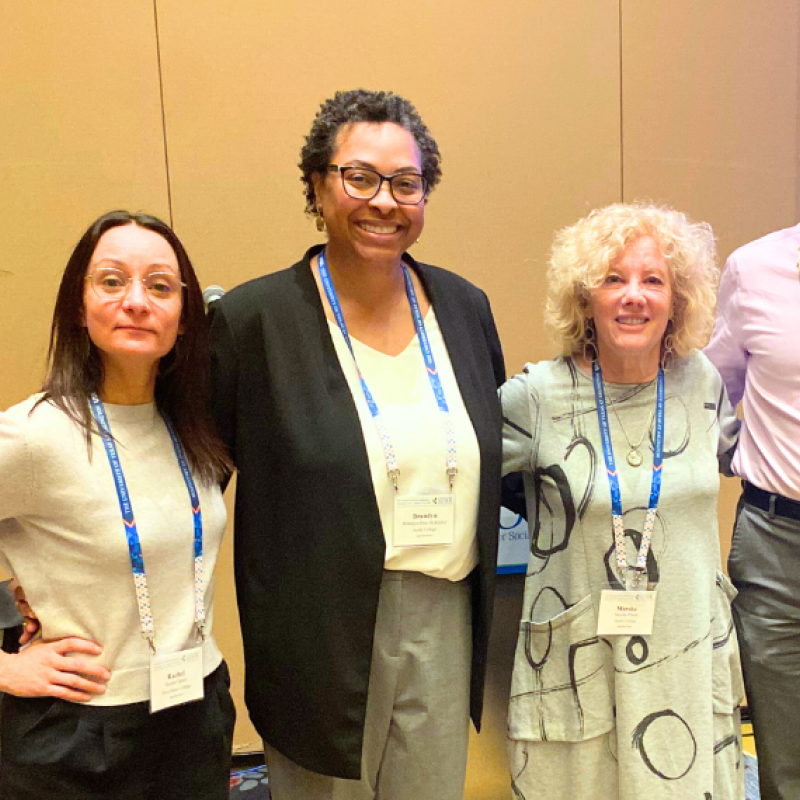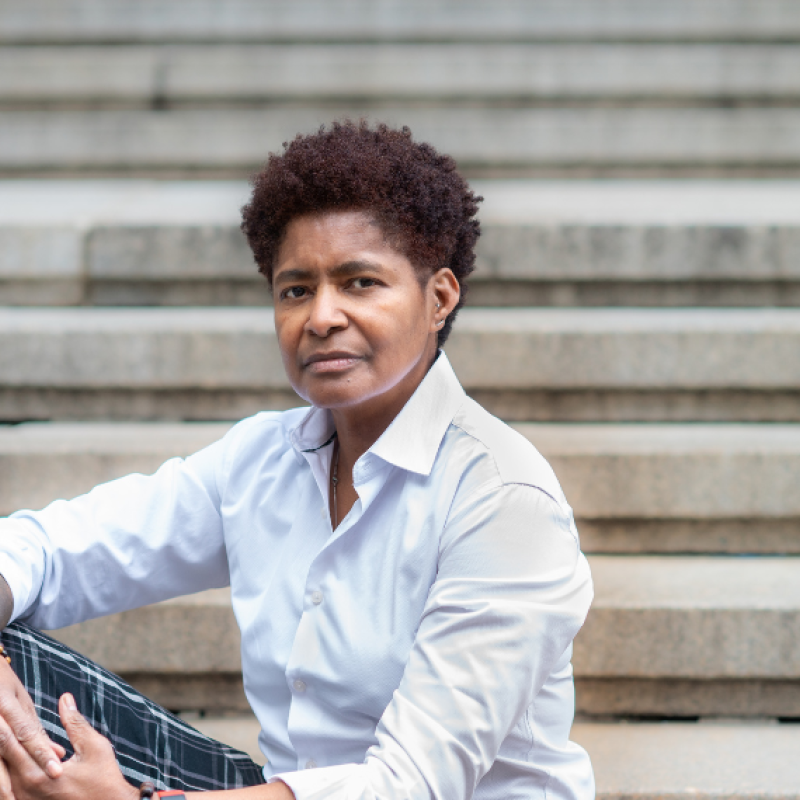

Smith College couldn’t have been a better landing place for Lev Fein, AC ’21, M.S.W, ’25. They transitioned from an insular community that prohibited higher education – where life followed a prescribed script – to a liberating academic environment where possibilities were limitless. They found their second home in Smith and in Northampton; a place where they could fully be themselves in their queerness and Jewishness, where they could soak up knowledge and explore the intersections of their identities in ways they never dreamed possible.
Fein specializes in trauma therapy and EMDR, specifically working with queer community members and people who have left fundamentalist religious communities, and plans to specialize in psychedelic-assisted therapy, which they believe is the future for trauma intervention.
A proud double Smithie, they grew up in a Chassidic ultra-Orthodox fundamentalist Jewish community in Brooklyn where education was not an option. Married young in an arranged marriage as is customary, they had no access to books or media, and dreams of a career were unthinkable. Though breaking away was difficult, Fein discovered an unexpected wellspring of strength in their emerging queerness and hunger for learning, ultimately leaving with their four children.”

Choice is important to Fein, who makes it clear that the strict prescribed structure of their former community works for some, including some of their friends and siblings, though they say it doesn’t have room for queer community members. Being able to make the choice to leave or stay is essential. Part of what limits that choice is social control, a concept they learned about in one of their classes.
“Restricting books and outside information prevents people from reaching self-actualization – that pinnacle of Maslow’s hierarchy,” Fein says. “Once someone discovers their true purpose despite these barriers, the entire restrictive framework begins to crumble.”
Leaving was inevitable for Fein, who needed to honor their authentic self – including their desire for both personal truth and a meaningful career. Fein strategically navigated the system to secure sole custody of their children, an uncommon outcome, as most children are removed from queer parents in the community. They said they felt incredibly grateful to leave the community with their kids and be welcomed with open arms at Smith. Growing up speaking mostly Yiddish and Spanish, they had a lot to learn, becoming the only person from their class who received a bachelor’s and master’s degree.
Fein was able to attend Rockland Community College (RCC) in Suffern, New York, with assistance from Footsteps, an organization that helps people leave insular communities with support, resources and scholarships. At RCC, their mentor Dr. Lynch saw their potential and urged them to apply to Smith College, which was completely unknown to Fein at the time. They made it to Smith which they said was the perfect landing place. While it may be called a bubble, Fein says it was a beautiful bubble and the right one for them and their family when they needed it. The Ada Comstock Scholar Program was very supportive and allowed their kids to grow up on campus.

As an Arab Jewish, Latinx and Yiddish-speaking polyglot fluent in four languages, Fein embodies a proud intersectionality: their queerness, being a parent, a social worker, off the derech (OTD) meaning “off the path” as a former member of a Chassidic community, and more. Parenting while at Smith wasn’t easy, but Fein built friendships with other parents and helped start the SSW Student Parent Organization.
“I saw all these queer social workers in Northampton and knew social work was my calling. As a Yiddish speaker, I want to serve my OTD community in the future. I want to be the example I wish I’d had and provide the guidance I lacked during my own departure. My message to them is simple: every dream you hold is achievable."

Fein highlights that community is essential for choice and change. “It’s not easy, but it’s possible,” they say. “You can be queer, pursue knowledge, be anything you want, if someone believes in you. You have to find your community. For me, that’s Northampton and Smith.” For Fein, learning to value community in a society that prizes individualism was a journey, but they now see it as one of the strongest supports for personal growth and transformation.
Representing OTDs and what is possible is deeply important to Fein. “You can get into good schools, even if you are a parent or a single parent, or don’t have a high school diploma,” Fein says, wanting people to understand their journey and see it as a viable option if they choose to leave.

This idea they embody – of going through a traumatic and hard experience and turning around to help other people who come after – Fein says, “That’s the only healing.”
When asked what to call the process, they say, “I think of it as emotional alchemy – transforming experiences into something that carries meaning and growth. You can let challenges settle over you, or you can reshape them into a story that guides your journey. For me, that journey led to earning my degrees, and I hope one day to return to the Ph.D. program.”
The heart of their time at Smith collecting degrees is made up of the relationships they built, with the people who make Smith and SSW so impactful. Fein shares gratitude for other parent friends and for Michelle Marchese, M.S.W. '11, Ph.D. candidate, whose mentorship and guidance have been instrumental throughout their SSW journey. She embodies the kind of clinician they aspire to be, combining expertise with genuine care, and continues to inspire Fein as they move into their career working at her practice. “Having her as both a supervisor and now a colleague has been one of the greatest gifts of my Smith experience. She’s the kind of mentor who doesn’t just teach you the work, she helps you find your own voice within it. I’m incredibly grateful for her guidance and excited to continue learning from her as I begin my career.”
As Fein looks toward their future, wide open with possibilities and continued learning, their ultimate goal is to open their own private practice focused on affirming care for queer community members and those who have left fundamentalist backgrounds, integrating approaches like psychedelic-assisted therapy to support deep personal transformation.
“There’s such a need for therapists who truly understand these unique experiences and can provide trauma-informed treatment that honors people’s identities and journeys.”
Their passion for evidence-based and relational approaches is clear in both their work and their words.
“The psychodynamic approach has shaped how I see this work. It’s taught me that our effectiveness isn’t just about knowing different techniques, but about the relational presence we bring to every interaction – and how unconscious patterns influence those connections. That insight has been invaluable for me.”
As for their future dream private practice, “It’s about creating healing spaces where people can not just recover, but truly thrive,” and will be rooted in a decolonized justice-focused foundation.
Fein reflects on the surreal feeling of concluding their seven years at Smith, a place that has truly become home. “I’m deeply grateful to Smith for everything,” they say. “I want my children to attend my alma mater, but even if they don’t, the lessons they’ve absorbed growing up on this campus will shape who they are. Wherever they go, they will carry the imprint of being Smithies, just as I always will.”


